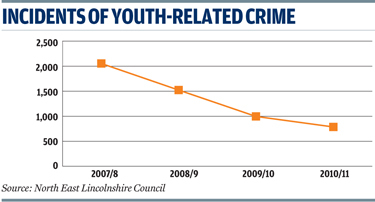How services in North East Lincolnshire unite to slash youth crime
Jo Stephenson
Tuesday, July 10, 2012
An integrated effort involving a range of agencies has driven down youth-related crime while boosting levels of youth participation

Project
North East Lincolnshire Council
Funding
The estimated annual cost, including management and central costs, is £3.29m. This comes from a combination of neighbourhood policing, youth offending services, the restorative justice team, street-based youth work, substance misuse services, sports and other youth services and the voluntary sector
Purpose
To reduce antisocial behaviour and youth crime and improve outcomes for young people
Background
In 2007, a range of organisations in North East Lincolnshire got together to develop a better partnership approach to services for young people involved in offending or at risk of entering the youth justice system. “Some areas had serious antisocial behaviour issues and we had a lot of problems with young people dropping in and out of the criminal justice system and getting involved in risky lifestyles,” explains Steve Kay, head of young people’s support services at North East Lincolnshire Council. “It was not just one service or organisation that could begin to tackle it. It had to be a collective effort.”
Action
In April 2007, North East Lincolnshire’s youth offending service moved its early intervention services to the council’s new integrated young people’s support service, which also includes careers advice and guidance, substance misuse and sexual health services, and positive activities for young people. A senior police officer with responsibility for youth is now a permanent member of the youth service’s management team.
Strong data has been crucial to help shape services including feedback from young people. Alongside the Council for Young People, North East Lincolnshire has a team of young advisers who work with local leaders and individual organisations.
Through the triage system, young people entering the criminal justice system for the first time are assessed within five days of a referral and get one-to-one support for at least six weeks, including help to access other services. The system is supported by a partnership between youth workers, the police, and the youth offending service, with help from a range of other organisations.
“At that point of entry, young people are at their most vulnerable,” says Kay. “We use restorative practices, but also look at the journey that the young person has taken up to that point and try to understand their needs and deal with their issues. It is effective youth work that enables these young people to move on.”
Goals of the system include increasing the number of young people involved in positive activities and reducing those not in education, employment or training (Neet). This includes regular contact with young people classed as Neet and provision of youth activities such as those offered by the Get Hooked on Positive Activities scheme. Formerly part of the council, this fishing project has become a social enterprise and now offers a wide range of other activities.
Outcome
An independent research report published in May found a 44 per cent reduction in youth crime, a 64 per cent reduction in youth-related offending and a 60 per cent reduction in antisocial behaviour. Total youth-related crime and antisocial behaviour incidents fell from 2,061 in 2007/08 to 793 in 2010/11. The triage service has also proved successful, with 96 per cent of young people referred not reoffending and at least 92 per cent attending school three months after referral. First-time entrants to the criminal justice system fell from 374 in 2007/08 to 120 in 2010/11.
The report also found an increase in the percentage of young people participating in positive activities, from 64 per cent in 2008/09 to 80 per cent in 2010/11. There have been year-on-year reductions in the numbers of young people not in education, employment or training, from 415 in 2007/08 to 223 in 2010/11.
Up to £10.85m of savings have been made from youth crime reduction and £18.3m from reducing Neet numbers. Researchers estimate that every £1 invested could save up to £2.20 with management costs taken into account.

If you think your project or programme is worthy of inclusion, email supporting data to janaki.mahadevan@markallengroup.com




